Mum 'reassured' over vital drug access decision
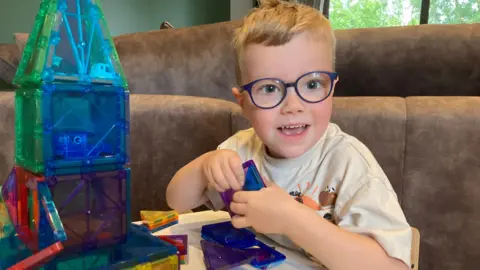 BBC
BBC"To know that he will have that treatment now for the rest of his life is incredible, it's so reassuring."
Emily's four-year-old son, Max, from Spinkhill, near Killarmarsh in Derbyshire, has CLN2 Batten disease, a rare degenerative genetic disorder that causes a decline in a child's ability to walk, speak and see.
He is symptom-free and has been receiving Brineura, the only approved treatment that slows the condition's progress, since he was one.
NHS access to the drug, which costs over £500,000 per patient per year, had been due to expire at the end of May, however an agreement was reached allowing existing patients to continue to have it.
However, it has not been recommended for future patients diagnosed beyond the end of 2025 "due to its high price and the limited evidence of long-term effectiveness", said the National Institute for Health and Care Excellence (NICE).
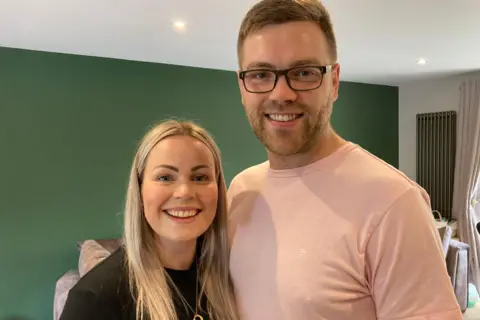
Max goes to Manchester Children's Hospital every two weeks to receive treatment.
"He has to stay on the bed for four hours, but because he's had this treatment since he was a baby he doesn't really know any different so he likes it," Emily said.
"He says he's 'going to get his medicine' and sees the doctors."
His dad, James, said Max receiving the treatment from a young age "has been absolutely key in the happy little boy that you see".
He added: "He's progressing amazingly well in terms of his abilities.
"He's still symptom-free in terms of Batten disease, so it's a real success for the drug."
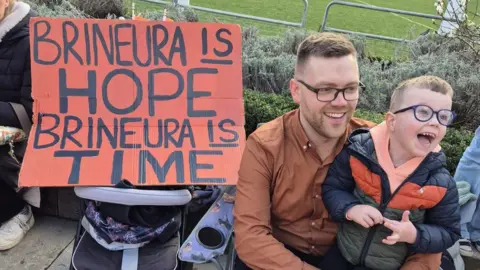 Supplied
SuppliedMax's older sister, Holly, also has Batten disease and had been receiving Brineura as part of her treatment.
However, the six-year-old was diagnosed later in life and the family felt she was not getting as much benefit from the drug as her symptoms increased and agreed it should be stopped.
James said: "Holly was on the treatment for around 12 months, but in that time her condition progressed and she started to lose more and more of her abilities.
"Within the space of a year, she'd gone from being a relatively normal and happy four-year-old to not being able to walk, losing all of her speech and losing her ability to eat and swallowing normally."
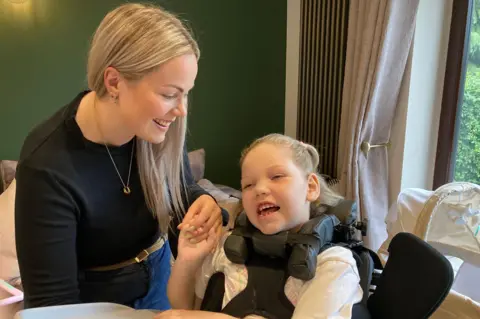
Emily and James's youngest child, four-month-old Rory, was born after the couple underwent in vitro fertilisation treatment.
Embryos were screened in advance to check if the condition might be passed on again and, as a result, Rory does not have Batten disease.
Emily said: "We were lucky to get four embryos that were unaffected and Rory was the first one that we transferred, so he's a healthy baby."
On the decision to stop the use of Brineura for children not yet diagnosed with Batten disease, NICE said: "This committee took into account the condition's rarity, severity and the effect of cerliponase alfa [the drug marketed as Brineura] on quality and length of life.
"But using the proposed price of the medicine, the most likely-cost effectiveness estimate is not within what NICE considers an acceptable use of NHS resources.
"So, cerliponase alfa is not recommended."
In response, the Batten Disease Family Association said: "Whilst this is naturally disappointing, it is important to note that this is not NICE's final guidance on the future of Brineura on the NHS."
The NICE committee will meet again in July to consider evidence and consultation feedback in relation to whether patients not currently diagnosed with Batten disease could receive the drug in future.
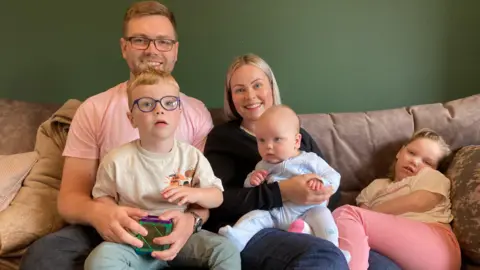
Follow BBC Derby on Facebook, on X, or on Instagram. Send your story ideas to [email protected] or via WhatsApp on 0808 100 2210.
